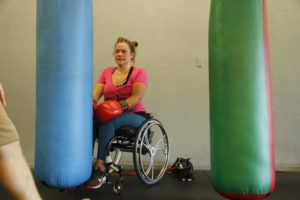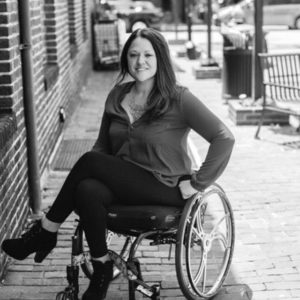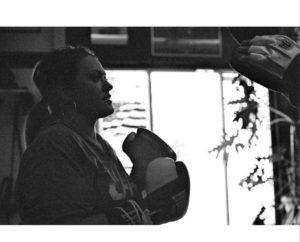From Philly to the Paralympics, one wheelchair boxer is hoping to get the first U.S. wheelchair boxing fight card sanctioning.
When you think of underdogs from Philadelphia, think of the 2018 World Champion Eagles who beat the heavily favored New England Patriots in the Super Bowl, or boxers like “Smokin’” Joe Frazier who came out victorious against a dominant Muhammad Ali, or the famous fictional character Rocky Balboa, whose statue is in the center of the city. But if you really want to think about underdogs you need to think of Samantha Twining,
The 33-year-old wheelchair boxer went blow for blow with paraplegia and now has the tough task of starting a federation of wheelchair boxers from the ground up. Then she hopes to have the first sanctioned United States amateur matches in her hometown of Philadelphia.
“I’m just somebody in a wheelchair who wants to train, and I know that this sport can be done from a wheelchair. We just have to prove it,” Twining says.
Twining’s passion for boxing dates back to 2012, four years after a drunk driving accident at age 21 damaged her spinal-cord and shattered her T9 vertebrae. Twining and a friend were in her car, which Twining was driving, and collided with a tractor trailer one night in the Philadelphia suburbs.
“I was drinking. That is a big learning lesson in itself. I partied a lot when I was a kid, and I didn’t have much of a direction,” Twining says. “Honestly, I wouldn’t like the person I was before, and going through this gave me a new outlook on life. “
Twining never thought for a second that boxing would be her path in life.
“I wasn’t really seeking boxing,” says Twining. “I didn’t start getting into fitness until about four and a half years after my accident. I just was in a lot of pain and I was learning to live. My dad put up a heavy bag in my room, and he taught me how to punch … I was paralyzed, so it was a good way to get cardio.”
The bag was a good start, but it was not enough for Twining, as she got some help from professional trainers in the mixed martial arts (MMA) gyms.
“I went in, I tried a class, the coaches were very adaptive,” Twining says.

Coaches and trainers changed up the way that they would normally cater to a boxer, the trainers found ways to do floor exercises on the internet, which would be more adaptive to Twining.
“The energy around the gym was great, and then we started personal training. They started incorporating holding pads in my workout for cardio, and I picked boxing up.” Twining says.
Currently, there is no official wheelchair boxing federation in North America, and that means there are no sanctioned, universal rules for the sport in the United States. There has been a start-up professional wheelchair boxing federation under the jurisdiction of the World Boxing Council (WBC) in the United Kingdom. These athletes are not eligible for the Paralympics because they are monetarily compensated.
“It wasn’t at that time a goal of mine to get in the ring and fight, but it was a way of working out,” Twining says. “Then, after some time, there seemed to be more conversation about it online.”
Twining is in a growing field of people who want to make a full league of amateurs happen in the United States, so there can be wheelchair boxing in the Paralympics. All the International Paralympic Committee (IPC) is waiting for is a completed, verified list of set rules for the sport and a business plan. Once confirmed between the new federation’s representative and the IPC, there can be an IPC vote for Paralympic entry.
Twining is working with USA Boxing and the International Boxing Federation to prove that wheelchair boxing can exist and set the necessary ground rules. She is also becoming a wheelchair/adaptive boxing goodwill ambassador to other countries.
“Last spring, I was the first woman to travel to a Canadian gym to bring adaptive boxing to life,” Twining says. “There were two British guys and a Canadian guy who was from Vancouver and had a nonprofit gym, and they flew us out and at that moment I realized that people really want to make [wheelchair boxing] a sport.”
Twining knows starting a league or federation of wheelchair boxers is no easy task. It will take a lot of action on her part to make it happen. Her first step is to think smaller and plan just for the first North American card.
“The target date I have is four to five months before the first card can be set. I am just waiting on my paperwork to make it easier for the 15 people [from Philadelphia] that I have,” Twining says. “2022 is the date when people will be ready to go in each state.”
Once the first card is made, Twining wants Philadelphia to become the training mecca for the United States Wheelchair Boxing team.
“I want to bring to Philadelphia all sorts of adaptive athletes who want to train to be a fighter,” Twining says. “You can’t just say you want to learn to be a fighter, you have to be at training every day, I would sell it more as a lifestyle because the ring is the end goal. That shows all your hard work and dedication to be true, when you are fighting another person at your level, you are showing the world, and the best man or woman wins.“

Twining knows that the life of a fighter is not cheap, and she wants to give back to the community, especially to those who are interested in becoming wheelchair boxers or adaptive MMA fighters. That is why she started the nonprofit PARAFull Mission.
“My nonprofit uses grant money to help people get into boxing and have training for traumatic injury survivors’ fitness-related therapy that they need,” says Twining. “Whether it’s boxing sessions or a program, and I will be able award some people grants to pay for some of the training.”
Twining’s charity also helps to get people comfortable in their chairs. She wants to get them out to gyms around the country.
“I know a lot of people are at home, and they aren’t comfortable in their chairs,” Twining says.
“I want more people to reach out and be like, ‘Adaptive boxing… is that a thing?’ Then I can point them out to a gym.”
Whenever the first official card happens, Twining would love to be fighting on it.
“I would probably be jealous if I arranged the card and there was another female on it,“ Twining says. “I want to put on the first fight right here in Philadelphia.”
She knows that being on the first card is a long shot due to her age and business entrepreneurship taking top priority, but she knows that long shots do happen, especially in Philadelphia, the home of the underdog.
“It’s about how hard you train. It’s about you against the world. It’s you and you are it.” Twining says.
For more information on wheelchair boxing or PARAFull Mission, visit https://parafull.weebly.com/

2 Responses
Hi ,my name is Fernando Flores I’m a paraplegic film maker,I use to box many yes ago. I’m excited I’m from Newark nj I was at The world champions gym Shakur Stevenson I terviewing his Trainer before the interview I rolled my wheel chair to the speed bag and stated to hit it . Soon after Shakur Stevenson trainer said to he was looking for a wheel chair fighter that this summer will be paralymics and wheel chair boxing will be included I’ve made a decision to want to compete. I’m very excited I’m so happy you started this I simply want to tell you thank you.
I’ve been paralyzed since August 23rd 2016. T11 SCI. I NEED TO GET OUT OF THIS BED AND BACK INTO MY WHEELCHAIR AND GET BUSY. I’M GLAD I LOOKED THIS UP! AWESOMENESS!!!!PETERSBURG VA.